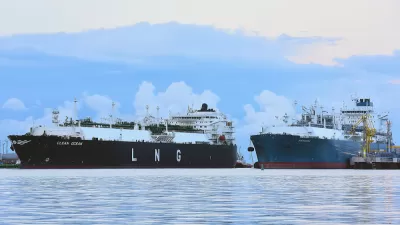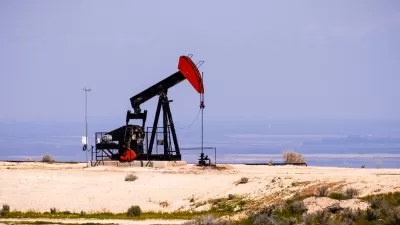A major reason given by Keystone XL pipeline supporters is that the Canadian oil it will deliver to Gulf refineries will help make the U.S. 'energy independent', yet data shows that those refineries are now exporting 60% of the gasoline they produce.
Keith Johnson writes that "(m)uch of the crude oil that would flow down the proposed Keystone XL oil pipeline would likely be exported as refined product". The finding is based on data that was presented on March 14 by Oil Change International, "a nonprofit advocacy group that opposes the pipeline." Based on U.S. Census Bureau data for 2012, "the group says the Texas Gulf Coast refiners that would be the main recipients of Keystone-shipped crude exported:
- More than 60% of the gasoline they produced,
- 40% of their diesel output and
- 95% of their petroleum coke"
The refineries do not dispute the numbers, "but say that is no reason to shun Keystone XL." They point to the economic advantages of keeping "refinery employees on the job and help(ing) the trade deficit."
In many ways, the economics of refining crude oil mirrors that of liquefied natural gas (LNG). Five years ago, LNG terminals were built to import natural gas when prices were spiking. "Now, the same companies that had such high hopes for imports are proposing to salvage those white elephants by spending billions more to convert them into terminals to export some of the nation’s extra gas to Asia and Europe, where gas is roughly triple the American price", wrote New York Times correspondent Clifford Krause.
Similarly, "(w)hen the Keystone pipeline was first proposed in 2007, U.S. fuel demand was booming and domestic oil supplies seemed to be thinning", writes Johnson.
Since then, U.S. oil production has grown and demand has stagnated. As a result, U.S. refineries are increasingly cranking out gasoline, diesel and jet fuel for overseas markets, in particular Latin America. U.S. exports of refined products have nearly tripled since 2005, according to government data, and the U.S. became a net exporter of those products in 2011.
No matter - Keystone XL boosters will continue to tout "energy independence" in advocating for the controversial 1,179-mile pipeline, as Ben German of The Hill's Energy & Environment Blog noted in his article about upcoming energy legislation.
“H.R. 3 is really about one thing. It is about energy independence for North America,” House Energy and Commerce Committee Chairman Fred Upton (R-Mich.) said at a bicameral press conference with several Republicans and centrist Democrats.
In an unusual twist of events, one Texas refinery plans to export crude oil to Quebec City, Canada, reports The Globe And Mail's global energy expert, Shawn McCarthy:
Valero – the largest independent refiner in North America – has received a one-year, renewable permit from the U.S. Commerce Department to export crude to Canada in order improve the competitiveness of its Quebec plant, which now relies on high-priced imported crude.
Why not ship the oil to Atlantic ports in the U.S.? Have you heard of "a U.S. law known as the Jones Act which requires all cargo moved between American ports to be carried on U.S.-flagged vessels"?
Valero said it would cost only $2 (U.S.) a barrel to transport crude to Eastern Canada in internationally flagged carriers, while it costs more than $5 a barrel to ship crude from Texas to refineries on the U.S. East Coast.
Correspondent's note: Access to entire article may be restricted after March 22 for those without Wall Street Journal subscriptions.
FULL STORY: Oil Exports Spur More Questions About Pipeline

Alabama: Trump Terminates Settlements for Black Communities Harmed By Raw Sewage
Trump deemed the landmark civil rights agreement “illegal DEI and environmental justice policy.”

Planetizen Federal Action Tracker
A weekly monitor of how Trump’s orders and actions are impacting planners and planning in America.

Why Should We Subsidize Public Transportation?
Many public transit agencies face financial stress due to rising costs, declining fare revenue, and declining subsidies. Transit advocates must provide a strong business case for increasing public transit funding.

Understanding Road Diets
An explainer from Momentum highlights the advantages of reducing vehicle lanes in favor of more bike, transit, and pedestrian infrastructure.

New California Law Regulates Warehouse Pollution
A new law tightens building and emissions regulations for large distribution warehouses to mitigate air pollution and traffic in surrounding communities.

Phoenix Announces Opening Date for Light Rail Extension
The South Central extension will connect South Phoenix to downtown and other major hubs starting on June 7.
Urban Design for Planners 1: Software Tools
This six-course series explores essential urban design concepts using open source software and equips planners with the tools they need to participate fully in the urban design process.
Planning for Universal Design
Learn the tools for implementing Universal Design in planning regulations.
Caltrans
Smith Gee Studio
Institute for Housing and Urban Development Studies (IHS)
City of Grandview
Harvard GSD Executive Education
Toledo-Lucas County Plan Commissions
Salt Lake City
NYU Wagner Graduate School of Public Service





























